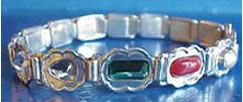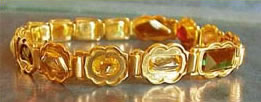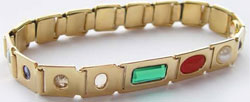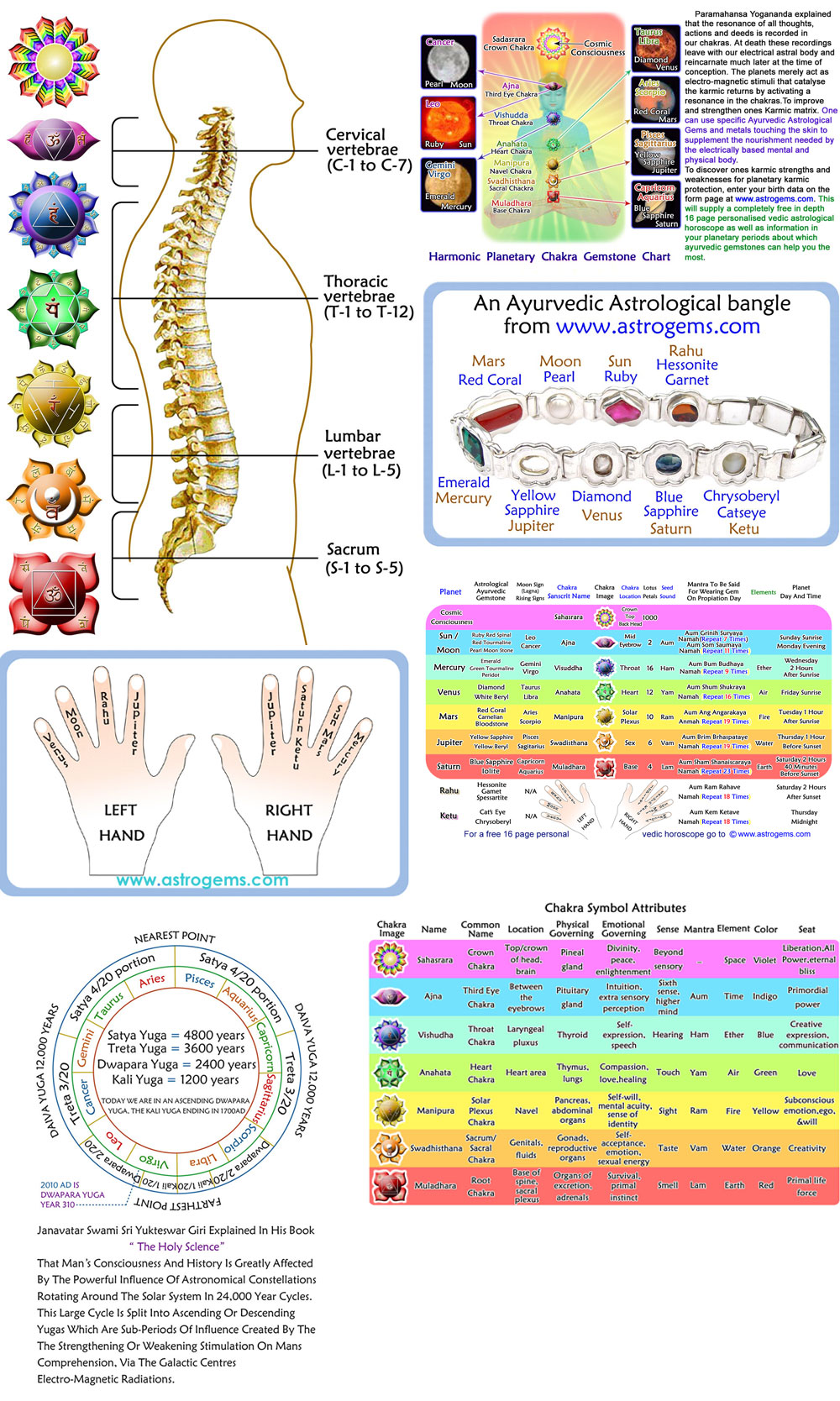|
What
the Yoga Masters Have To Say
 Excerpts
from "Autobiography of a Yogi" Excerpts
from "Autobiography of a Yogi"
The
first part of Chapter 16
Outwitting
the Stars
"Mukunda, why don't you get an astrological armlet?"
"Should I, Master? I don't believe in astrology."
"It is never a question of belief; the only scientific
attitude one can take on any subject is whether it is true.
The law of gravitation worked as efficiently before Newton
as after him. The cosmos would be fairly chaotic if its laws
could not operate without the sanction of human belief.
"Charlatans have brought the stellar science to its
present state of disrepute. Astrology is too vast, both mathematically1
and philosophically, to be rightly grasped except by men of
profound understanding. If ignoramuses misread the heavens,
and see there a scrawl instead of a script, that is to be
expected in this imperfect world. One should not dismiss the
wisdom with the 'wise.'
"All parts of creation are linked together and interchange
their influences. The balanced rhythm of the universe is rooted
in reciprocity," my guru continued. "Man, in his
human aspect, has to combat two sets of forces—first,
the tumults within his being, caused by the admixture of earth,
water, fire, air, and ethereal elements; second, the outer
disintegrating powers of nature. So long as man struggles
with his mortality, he is affected by the myriad mutations
of heaven and earth.
"Astrology is the study of man's response to planetary
stimuli. The stars have no conscious benevolence or animosity;
they merely send forth positive and negative radiations. Of
themselves, these do not help or harm humanity, but offer
a lawful channel for the outward operation of cause-effect
equilibriums which each man has set into motion in the past.

"A child is born on that day and at that hour when the
celestial rays are in mathematical harmony with his individual
karma. His horoscope is a challenging portrait, revealing
his unalterable past and its probable future results. But
the natal chart can be rightly interpreted only by men of
intuitive wisdom: these are few.
"The message boldly blazoned across the heavens at the
moment of birth is not meant to emphasize fate—the result
of past good and evil—but to arouse man's will to escape
from his universal thralldom. What he has done, he can undo.
None other than himself was the instigator of the causes of
whatever effects are now prevalent in his life. He can overcome
any limitation, because he created it by his own actions in
the first place, and because he has spiritual resources which
are not subject to planetary pressure.
"Superstitious awe of astrology makes one an automaton,
slavishly dependent on mechanical guidance. The wise man defeats
his planets—which is to say, his past—by transferring
his allegiance from the creation to the Creator. The more
he realizes his unity with Spirit, the less he can be dominated
by matter. The soul is ever-free; it is deathless because
birthless. It cannot be regimented by stars.
"Man is a soul, and has a body. When he properly places
his sense of identity, he leaves behind all compulsive patterns.
So long as he remains confused in his ordinary state of spiritual
amnesia, he will know the subtle fetters of environmental
law.
"God is harmony; the devotee who attunes himself will
never perform any action amiss. His activities will be correctly
and naturally timed to accord with astrological law. After
deep prayer and meditation he is in touch with his divine
consciousness; there is no greater power than that inward
protection."
"Then, dear Master, why do you want me to wear an astrological
bangle?" I ventured this question after a long silence,
during which I had tried to assimilate Sri Yukteswar's noble
exposition.
"It is only when a traveler has reached his goal that
he is justified in discarding his maps. During the journey,
he takes advantage of any convenient short cut. The ancient
rishis discovered many ways to curtail the period of man's
exile in delusion. There are certain mechanical features in
the law of karma which can be skillfully adjusted by the fingers
of wisdom.
"All human ills arise from some transgression of universal
law. The scriptures point out that man must satisfy the laws
of nature, while not discrediting the divine omnipotence.
He should say: 'Lord, I trust in Thee, and know Thou canst
help me, but I too will do my best to undo any wrong I have
done.' By a number of means—by prayer, by will power,
by yoga meditation, by consultation with saints, by use of
astrological bangles—the adverse effects of past wrongs
can be minimized or nullified.

"Just as a house can be fitted with a copper rod to
absorb the shock of lightning, so the bodily temple can be
benefited by various protective measures. Ages ago our yogis
discovered that pure metals emit an astral light which is
powerfully counteractive to negative pulls of the planets.
Subtle electrical and magnetic radiations are constantly circulating
in the universe; when a man's body is being aided, he does
not know it; when it is being disintegrated, he is still in
ignorance. Can he do anything about it?
"This problem received attention from our rishis; they
found helpful not only a combination of metals, but also of
plants and—most effective of all—faultless jewels
of not less than two carats. The preventive uses of astrology
have seldom been seriously studied outside of India. One little-known
fact is that the proper jewels, metals, or plant preparations
are valueless unless the required weight is secured, and unless
these remedial agents are worn next to the skin."
"Sir, of course I shall take your advice and get a bangle.
I am intrigued at the thought of outwitting a planet!"
"For general purposes I counsel the use of an armlet
made of gold, silver, and copper. But for a specific purpose
I want you to get one of silver and lead." Sri Yukteswar
added careful directions.
"Guruji, what 'specific purpose' do you mean?"
"The stars are about to take an unfriendly interest
in you, Mukunda. Fear not; you shall be protected. In about
a month your liver will cause you much trouble. The illness
is scheduled to last for six months, but your use of an astrological
armlet will shorten the period to twenty-four days."
I sought out a jeweler the next day, and was soon wearing
the bangle. My health was excellent; Master's prediction slipped
from my mind. He left Serampore to visit Benares. Thirty days
after our conversation, I felt a sudden pain in the region
of my liver. The following weeks were a nightmare of excruciating
pain. Reluctant to disturb my guru, I thought I would bravely
endure my trial alone.

But twenty-three days of torture weakened my resolution;
I entrained for Benares. There Sri Yukteswar greeted me with
unusual warmth, but gave me no opportunity to tell him my
woes in private. Many devotees visited Master that day, just
for a darshan. 2 Ill and neglected, I sat in a corner. It
was not until after the evening meal that all guests had departed.
My guru summoned me to the octagonal balcony of the house.
"You must have come about your liver disorder."
Sri Yukteswar's gaze was averted; he walked to and fro, occasionally
intercepting the moonlight. "Let me see; you have been
ailing for twenty-four days, haven't you?"
"Yes, sir."
"Please do the stomach exercise I have taught you."

"If you knew the extent of my suffering, Master, you
would not ask me to exercise." Nevertheless I made a
feeble attempt to obey him.
"You say you have pain; I say you have none. How can
such contradictions exist?" My guru looked at me inquiringly.
I was dazed and then overcome with joyful relief. No longer
could I feel the continuous torment that had kept me nearly
sleepless for weeks; at Sri Yukteswar's words the agony vanished
as though it had never been.
I started to kneel at his feet in gratitude, but he quickly
prevented me.
"Don't be childish. Get up and enjoy the beauty of the
moon over the Ganges." But Master's eyes were twinkling
happily as I stood in silence beside him. I understood by
his attitude that he wanted me to feel that not he, but God,
had been the Healer.
I wear even now the heavy silver and lead bangle, a memento
of that day—long-past, ever-cherished—when I found
anew that I was living with a personage indeed superhuman.
On later occasions, when I brought my friends to Sri Yukteswar
for healing, he invariably recommended jewels or the bangle,
extolling their use as an act of astrological wisdom.

I had been prejudiced against astrology from my childhood,
partly because I observed that many people are sequaciously
attached to it, and partly because of a prediction made by
our family astrologer: "You will marry three times, being
twice a widower." I brooded over the matter, feeling
like a goat awaiting sacrifice before the temple of triple
matrimony.
"You may as well be resigned to your fate," my
brother Ananta had remarked. "Your written horoscope
has correctly stated that you would fly from home toward the
Himalayas during your early years, but would be forcibly returned.
The forecast of your marriages is also bound to be true."
A clear intuition came to me one night that the prophecy
was wholly false. I set fire to the horoscope scroll, placing
the ashes in a paper bag on which I wrote: "Seeds of
past karma cannot germinate if they are roasted in the divine
fires of wisdom." I put the bag in a conspicuous spot;
Ananta immediately read my defiant comment.
"You cannot destroy truth as easily as you have burnt
this paper scroll." My brother laughed scornfully.
It is a fact that on three occasions before I reached manhood,
my family tried to arrange my betrothal. Each time I refused
to fall in with the plans,3 knowing that my love for God was
more overwhelming than any astrological persuasion from the
past.
"The deeper the self-realization of a man, the more
he influences the whole universe by his subtle spiritual vibrations,
and the less he himself is affected by the phenomenal flux."
These words of Master's often returned inspiringly to my mind.
Occasionally I told astrologers to select my worst periods,
according to planetary indications, and I would still accomplish
whatever task I set myself. It is true that my success at
such times has been accompanied by extraordinary difficulties.
But my conviction has always been justified: faith in the
divine protection, and the right use of man's God-given will,
are forces formidable beyond any the "inverted bowl"
can muster.
The starry inscription at one's birth, I came to understand,
is not that man is a puppet of his past. Its message is rather
a prod to pride; the very heavens seek to arouse man's determination
to be free from every limitation. God created each man as
a soul, dowered with individuality, hence essential to the
universal structure, whether in the temporary role of pillar
or parasite. His freedom is final and immediate, if he so
wills; it depends not on outer but inner victories.
Sri Yukteswar discovered the mathematical application
On my return from Japan, I learned that during my absence Nalini had been stricken with typhoid fever. I rushed to her home, and was aghast to find her reduced to a mere skeleton. She was in a coma.
"Before her mind became confused by illness," my brother-in-law told me, "she often said: 'If brother Mukunda were here, I would not be faring thus.'" He added despairingly, "The other doctors and myself see no hope. Blood dysentery has set in, after her long bout with typhoid."
I began to move heaven and earth with my prayers. Engaging an Anglo-Indian nurse, who gave me full cooperation, I applied to my sister various yoga techniques of healing. The blood dysentery disappeared.
For a free high resolution copy of this image
of Swami Sri Yukteswar Click Here.
But Dr. Bose shook his head mournfully. "She simply has no more blood left to shed."
"She will recover," I replied stoutly. "In seven days her fever will be gone."
A week later I was thrilled to see Nalini open her eyes and gaze at me with loving recognition. From that day her recovery was swift. Although she regained her usual weight, she bore one sad scar of her nearly fatal illness: her legs were paralyzed. Indian and English specialists pronounced her a hopeless cripple.
The incessant war for her life which I had waged by prayer had exhausted me. I went to Serampore to ask Sri Yukteswar's help. His eyes expressed deep sympathy as I told him of Nalini's plight.
"Your sister's legs will be normal at the end of one month." He added, "Let her wear, next to her skin, a band with an unperforated two-carat pearl, held on by a clasp."
I prostrated myself at his feet with joyful relief.
"Sir, you are a master; your word of her recovery is enough But if you insist I shall immediately get her a pearl."
My guru nodded. "Yes, do that." He went on to correctly describe the physical and mental characteristics of Nalini, whom he had never seen.
"Sir," I inquired, "is this an astrological analysis? You do not know her birth day or hour."
Sri Yukteswar smiled. "There is a deeper astrology, not dependent on the testimony of calendars and clocks. Each man is a part of the Creator, or Cosmic Man; he has a heavenly body as well as one of earth. The human eye sees the physical form, but the inward eye penetrates more profoundly, even to the universal pattern of which each man is an integral and individual part."
I returned to Calcutta and purchased a pearl for Nalini. A month later, her paralyzed legs were completely healed.
Sister asked me to convey her heartfelt gratitude to my guru. He listened to her message in silence. But as I was taking my leave, he made a pregnant comment.
"Your sister has been told by many doctors that she can never bear children. Assure her that in a few years she will give birth to two daughters."
Some years later, to Nalini's joy, she bore a girl, followed in a few years by another daughter.
"Your master has blessed our home, our entire family," my sister said. "The presence of such a man is a sanctification on the whole of India. Dear brother, please tell Sri Yukteswarji that, through you, I humbly count myself as one of his KRIYA YOGA disciples."

The
first part of Chapter 17
Sasi and the Three Sapphires
"Because
you and my son think so highly of Swami Sri Yukteswar, I will
take a look at him." The tone of voice used by Dr. Narayan
Chunder Roy implied that he was humoring the whim of half-wits.
I concealed my indignation, in the best traditions of the
proselyter.
My companion, a veterinary surgeon, was a confirmed agnostic.
His young son Santosh had implored me to take an interest
in his father. So far my invaluable aid had been a bit on
the invisible  side. side.
Dr. Roy accompanied me the following day to the Serampore
hermitage. After Master had granted him a brief interview,
marked for the most part by stoic silence on both sides, the
visitor brusquely departed.
"Why bring a dead man to the ashram?" Sri Yukteswar
looked at me inquiringly as soon as the door had closed on
the Calcutta skeptic.
"Sir! The doctor is very much alive!"
"But in a short time he will be dead."
I was shocked. "Sir, this will be a terrible blow to
his son. Santosh yet hopes for time to change his father's
materialistic views. I beseech you, Master, to help the man."
"Very well; for your sake." My guru's face was
impassive. "The proud horse doctor is far gone in diabetes,
although he does not know it. In fifteen days he will take
to his bed. The physicians will give him up for lost; his
natural time to leave this earth is six weeks from today.
Due to your intercession, however, on that date he will recover.
But there is one condition. You must get him to wear an astrological
bangle; he will doubtless object as violently as one of his
horses before an operation!" Master chuckled.
After a silence, during which I wondered how Santosh and
I could best employ the arts of cajolery on the recalcitrant
doctor, Sri Yukteswar made further disclosures.
"As soon as the man gets well, advise him not to eat
meat. He will not heed this counsel, however, and in six months,
just as he is feeling at his best, he will drop dead. Even
that six-month extension of life is granted him only because
of your plea."
The following day I suggested to Santosh that he order an
armlet at the jeweler's. It was ready in a week, but Dr. Roy
refused to put it on.
"I am in the best of health. You will never impress
me with these astrological superstitions." The doctor
glanced at me belligerently.
I recalled with amusement that Master had justifiably compared
the man to a balky horse. Another seven days passed; the doctor,
suddenly ill, meekly consented to wear the bangle. Two weeks
later the physician in attendance told me that his patient's
case was hopeless. He supplied harrowing details of the ravages
inflicted by diabetes.
I shook my head. "My guru has said that, after a sickness
lasting one month, Dr. Roy will be well."
The physician stared at me incredulously. But he sought me
out a fortnight later, with an apologetic air.
"Dr. Roy has made a complete recovery!" he exclaimed.
"It is the most amazing case in my experience. Never
before have I seen a dying man show such an inexplicable comeback.
Your guru must indeed be a healing prophet!"
After one interview with Dr. Roy, during which I repeated
Sri Yukteswar's advice about a meatless diet, I did not see
the man again for six months. He stopped for a chat one evening
as I sat on the piazza of my family home on Gurpar Road.
"Tell your teacher that by eating meat frequently, I
have wholly regained my strength. His unscientific ideas on
diet have not influenced me." It was true that Dr. Roy
looked a picture of health.
But the next day Santosh came running to me from his home
on the next block. "This morning Father dropped dead!"
This case was one of my strangest experiences with Master.
He healed the rebellious veterinary surgeon in spite of his
disbelief, and extended the man's natural term on earth by
six months, just because of my earnest supplication. Sri Yukteswar
was boundless in his kindness when confronted by the urgent
prayer of a devotee.
It was my proudest privilege to bring college friends to
meet my guru. Many of them would lay aside—at least
in the ashram!—their fashionable academic cloak of religious
skepticism.
One of my friends, Sasi, spent a number of happy week ends
in Serampore. Master became immensely fond of the boy, and
lamented that his private life was wild and disorderly.
"Sasi, unless you reform, one year hence you will be
dangerously ill." Sri Yukteswar gazed at my friend with
affectionate exasperation. "Mukunda is the witness: don't
say later that I didn't warn you."
Sasi laughed. "Master, I will leave it to you to interest
a sweet charity of cosmos in my own sad case! My spirit is
willing but my will is weak. You are my only savior on earth;
I believe in nothing else."
"At least you should wear a two-carat blue sapphire.
It will help you."
"I can't afford one. Anyhow, dear guruji, if trouble
comes, I fully believe you will protect me."
"In a year you will bring three sapphires," Sri
Yukteswar replied cryptically. "They will be of no use
then."
Variations on this conversation took place regularly. "I
can't reform!" Sasi would say in comical despair. "And
my trust in you, Master, is more precious to me than any stone!"
A year later I was visiting my guru at the Calcutta home
of his disciple, Naren Babu. About ten o'clock in the morning,
as Sri Yukteswar and I were sitting quietly in the second-floor
parlor, I heard the front door open. Master straightened stiffly.
"It is that Sasi," he remarked gravely. "The
year is now up; both his lungs are gone. He has ignored my
counsel; tell him I don't want to see him."
Half stunned by Sri Yukteswar's sternness, I raced down the
stairway. Sasi was ascending.
"O Mukunda! I do hope Master is here; I had a hunch
he might be."
"Yes, but he doesn't wish to be disturbed."
Sasi burst into tears and brushed past me. He threw himself
at Sri Yukteswar's feet, placing there three beautiful sapphires.
"Omniscient guru, the doctors say I have galloping tuberculosis!
They give me no longer than three more months! I humbly implore
your aid; I know you can heal me!"
"Isn't it a bit late now to be worrying over your life?
Depart with your jewels; their time of usefulness is past."
Master then sat sphinxlike in an unrelenting silence, punctuated
by the boy's sobs for mercy.
 |
|
An intuitive conviction came to me that Sri Yukteswar was
merely testing the depth of Sasi's faith in the divine healing
power. I was not surprised a tense hour later when Master
turned a sympathetic gaze on my prostrate friend.
"Get up, Sasi; what a commotion you make in other people's
houses! Return your sapphires to the jeweler's; they are an
unnecessary expense now. But get an astrological bangle and
wear it. Fear not; in a few weeks you shall be well."
Sasi's smile illumined his tear-marred face like sudden sun
over a sodden landscape. "Beloved guru, shall I take
the medicines prescribed by the doctors?"
Sri Yukteswar's glance was longanimous. "Just as you
wish—drink them or discard them; it does not matter.
It is more possible for the sun and moon to interchange their
positions than for you to die of tuberculosis." He added
abruptly, "Go now, before I change my mind!"
With an agitated bow, my friend hastily departed. I visited
him several times during the next few weeks, and was aghast
to find his condition increasingly worse.
"Sasi cannot last through the night." These words
from his physician, and the spectacle of my friend, now reduced
almost to a skeleton, sent me posthaste to Serampore. My guru
listened coldly to my tearful report.
"Why do you come here to bother me? You have already
heard me assure Sasi of his recovery."
I bowed before him in great awe, and retreated to the door.
Sri Yukteswar said no parting word, but sank into silence,
his unwinking eyes half-open, their vision fled to another
world.
I returned at once to Sasi's home in Calcutta. With astonishment
I found my friend sitting up, drinking milk.
"O Mukunda! What a miracle! Four hours ago I felt Master's
presence in the room; my terrible symptoms immediately disappeared.
I feel that through his grace I am entirely well."
In a few weeks Sasi was stouter and in better health than
ever before.1 But his singular reaction to his healing had
an ungrateful tinge: he seldom visited Sri Yukteswar again!
My friend told me one day that he so deeply regretted his
previous mode of life that he was ashamed to face Master.
I could only conclude that Sasi's illness had had the contrasting
effect of stiffening his will and impairing his manners. |
| ( This image is not in the Autobiography of a Yogi and is a color enhanced photo of Paramahansa Yogananda on the beach copyright www.astrogems.com) |
Page 1 | Page 2
| 








 Excerpts
from "Autobiography of a Yogi"
Excerpts
from "Autobiography of a Yogi"




 side.
side.


